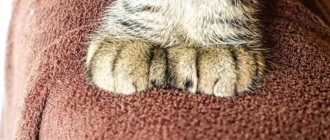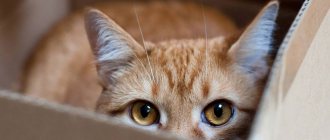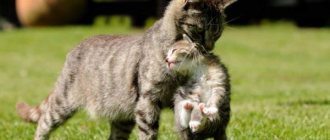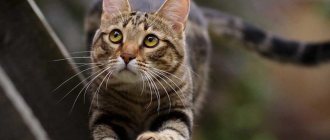Many cat owners have probably watched their pet bury food in her bowl more than once. This picture looks very funny, but not every owner thinks so - for some, this behavior of the pet seems abnormal. It is especially strange to see how an animal hides leftover food in the most secluded corners of the apartment.
There are at least two main reasons why cats bury food: innate instincts or acquired habits.
Saving food for later
A cat buries a bowl of food because that’s what its relatives did many years ago. This behavior is due to the desire to preserve supplies for the future. Outside the house, animals get their own food - for this they have to hunt, but not every hunt ends fruitfully. To avoid starvation, animals save food by burying it.
It is difficult to fight the instinct, and if the owners do not find other reasons for burying, they leave everything as it is.
Ancient instincts
Unconditioned reflexes necessary for survival are passed on to all living beings “by inheritance.” Cats are among those domesticated pets in whom they manifest themselves most acutely. The desire to bury a bowl of food is one of those ancient instincts. Under natural conditions, their wild relatives try to hide leftover food from competitors in this way. This gives them the opportunity to provide themselves with one of their key needs - satisfying hunger. After all, not every hunt does a wild cat return with prey in its teeth. Having previously hidden supplies is vital for her.
The mustache and competitors living in the house can provoke the manifestation of “thrifty behavior”. The fact is that wild cats living in prides always respect subordination. At home, when the flock consists of representatives of different families, subordination in most cases is broken.
The second unconditional instinct that can explain why a cat buries a bowl of food with its paw is the desire for cleanliness. Cats are by nature predators who cannot give away their location by smell. By hiding leftover food with a sharp, attractive smell to others, a wild cat solves two problems at once: it minimizes the risk that the prey will smell it and camouflages itself from a larger predator wandering nearby.
The natural instinct to maintain cleanliness can manifest itself when an animal smells an intolerable odor. Unable to throw the “muck” into the trash, they have no choice but to bury it deeper.
Most often, cats react this way to cheap dry food that has a sharp, sour odor. A pet may try to bury a bowl of food if the food has become damp during long-term storage.
If at some point your pet begins to refuse high-quality dry food, you should not rush to replace it. The phenomenon may be temporary. After all, cats’ moods, like people’s, are very changeable. It’s just that the pet decided to temporarily change its taste preferences by arranging “fasting” days for itself.
By emptying the bowl with its paw and moving the food to another area, the animal can signal that the feeding area is uncomfortable for it. The problem can only be solved by “listening” to the messages and moving the bowl to a secluded corner where no one will disturb him during the meal.
Unconditioned reflexes and their role
Every living creature and species survive thanks to unconditioned reflexes, that is, skills that an animal acquires “by inheritance.” Cats hunt because they know how and want to do it “by nature.” Purring, stomping, gently hitting your hand or face is also an instinct, this is how pets express their feelings, communicate and convey their smell to you.
There are a number of deep, unconditioned reflexes that control the survival of the animal as a whole:
- Breathing, coughing, sneezing.
- Sucking, chewing, hiccups, vomiting. By the way, when a cat gently tramples you with its paws, this is also an instinct associated with sucking milk. Kittens stimulate the flow of milk to the glands by massaging the mother's belly.
- The desire for security and peace is the ability and ability to protect oneself. This also includes the desire for a neutral smell and cleanliness.
- The desire to imitate and flock.
- Sexual hunting and parental instinct. A mother cat can not only bury food, but also hide it in unexpected places. A piece of meat may end up behind a heating radiator or refrigerator, and this fact will be detected by a rotten smell.
About reflexes
All life on the planet exists primarily thanks to reflexes, that is, skills passed on by inheritance. These include:
- breath;
- cough;
- vomiting;
- sneeze;
- hiccups;
- sucking.
For example, when a cat kneads your stomach with its paw, this is a reflex related to feeding. This is what kittens do when they suck milk so that it is released more actively. Schooling and imitation are also considered hereditary habits, as are sexual desire and parental feelings.
Unpleasant smell of stale food
You can easily notice that cats love cleanliness. They are unlikely to eat food that they do not like. Therefore, if the pet sniffed the bowl and began to bury it, we can talk about the poor quality of the food or its spoilage. The cat does not have the opportunity to throw away its food, so there is nothing left to do but bury it deeper.
Particularly capricious cats bury food that has been left in the air for only 2-3 hours. It is fundamentally important for such animals that they are given only fresh food - the owners may have to feed the shrew several times a day and little by little.
Poor quality food
Cats usually smell the food first before eating. If the pet did not touch the bowl of food and even tried to bury it, this means that it did not like the food. For example, a cat may “reject” slightly spoiled or weathered food, and also refuse to eat from a dirty bowl.
By nature, all representatives of the cat family are clean people. If they don't like the smell of food, they try to get rid of it quickly. Sometimes a cat buries food because it tries to dispose of it as the contents of a dirty tray, because food should always smell appetizing and fresh.
The food smells strong, you need to bury it so that other predators don’t come!
The wild ancestors of modern domestic cats were forced to obtain their own food. They existed in conditions of fierce competition, and in order to preserve their hard-earned food, they had to hide it in safe places that their relatives and other predatory fauna could not reach.
Some of their domesticated descendants have retained this skill, and even when well fed, they continue to bury food: after eating, they scratch the floor next to the bowl with their claws.
Cats usually bury food with a distinct odor, which, in their opinion, can attract predators eager for other people's supplies.
What to do?
Veterinarians believe that animal owners do not need to worry and look for psychological problems in cats, since the desire to bury food is absolutely normal for a predator.
If a cat buries a bowl of food, then felinologists recommend making sure that the pet does not experience stress while eating. It is necessary to give the cat personal space so that other animals cannot get close to his food. No loud technical devices should be installed near the bowl. The place where the animal eats must always be kept clean. To wean a cat from the habit of digging the floor, you need to normalize its diet - feed it often, but in small portions at one time. It is important to monitor the quality of products. Felinologists recommend interrupting floor digging by giving your pet a toy.
Competition with other animals
One of the reasons why cats may bury food is due to competition with other cats or dogs that share their territory.
In this case, there are two options why the cat buries a bowl of food:
- This can happen if the cat does not live at home alone, that is, several cats or other pets live in one apartment. The instinct of competition awakens in the animal, and it buries a bowl of leftover food so that others do not encroach on its food.
- The reason may be feeding the cat outside (for example, if the owners live in a private house and prefer to place the bowl of food outside the house). In this case, the cat senses that there may be other cats nearby, and instinctively buries the leftover food so that its smell does not attract strangers.
It is worth setting the number of bowls according to the number of “heads”. In some cases, it will be necessary to delineate the place for food - if serious battles break out because of it.
Mr. Cat recommends: the main reasons for burying food
Experts identify several possible reasons why a cat may bury food. Among them:
- excess food (the cat tries to hide food or hide traces of its presence, obeying instinct);
- inadequate quality or unsatisfactory organoleptic characteristics of food for a particular animal (a cat may not like the taste or smell of food, on the basis of which it concludes that it is not suitable for it; this may be due to both the animal’s own preferences and the fact that the product is spoiled) ;
- foreign smell, dissatisfaction with the feeding utensil itself or its poor location;
- dirt in the feeding area (if the area under the bowl is not cleaned, and the dishes themselves are not washed for a long time, the cat will try to remove disgusting, from her point of view, odors using her own methods);
- lack of food (when a cat buries an empty bowl, it is looking for supplies);
- stressful state (being under excessive emotional stress, the cat may not have an appetite, and tries to provide itself with food for the future period when food is needed).
It is especially common to observe the burying of food in those houses where several cats live at once or where there is a dog together. The animal then tries to hide the strategic reserve from competitors.
The most dangerous reason is poor health caused by some disease. A cat may refuse food and hide it for the future if there is no appetite due to pathological processes occurring in its body.
If the cat has not previously shown a desire to bury the bowl, then it is worth carefully observing its behavior when it suddenly refuses to eat, and even digs up food. Maybe the animal needs treatment.
Habits
As you know, a habit is the result of life experience, both positive and negative. Most domestic cats are litter box trained; they know very well that they cannot go to the toilet anywhere else. As a kitten, your pet has learned the full consequences of inappropriate behavior.
How is the litter box related to burying food? Almost directly. Usually, the drinking bowl and feeder are located next to each other, and sometimes the bowl is combined. Not all owners get around to buying a non-slip, moisture-absorbing mat. When these factors combine, the following may occur: the cat touches the drinking bowl, water splashes, and a puddle appears on the floor. Seeing a puddle and knowing the consequences, the cat tries to eliminate the “misdemeanor” as quickly as possible; it digs the floor, and after (especially if you hit the cat as punishment), it turns over the feeder and buries the water with food.
Stress
Like many people, cats experience a lot of stress due to external factors. When an animal experiences anxiety, its appetite decreases and its health worsens. In this case, the cat may try to save food for a time when he feels better and wants to snack. Stress factors can be moving, the arrival of a new pet or small child in the house, as well as rearranging, changing the tray, filler or bowl.
If a cat buries food for no apparent reason, the owner needs to determine what this means as soon as possible so as not to miss the stressful or painful state of his pet.
Inconvenient bowl location
If your cat buries food, you can assume that this is due to an inconvenient or incorrectly placed bowl. In this case, the cat points out to the owner what does not suit her. Perhaps the cat doesn’t like the smell of the place where it eats, the sounds made by household appliances, or everything is connected with drafts - if the bowl is close to the windows or the front door.
Try moving the plate the cat is eating from. Perhaps after the first or second rearrangement she will stop burying food.
Why do cats bury food?
Many owners notice that after eating, their furry pets try to bury their bowls - they scratch the floor around them. Some people find this behavior funny, while others think that cats are being mischievous or they simply don’t like the food. In fact, there are many reasons that can explain this behavior.
Historically, absolutely all cats bury their food. People don't notice differences in the smells of cat food. However, cats recognize them perfectly. This happens thanks to pheromones - unique chemical markers of odors.
Inconvenient bowl
No matter how strange it may sound, comfort is also important to animals. This also includes the dishes from which the pet eats food. If it is inconvenient for him to eat from the option offered by the owner, then most likely the food in the bowl will be buried until new utensils are purchased.
You need to choose a not very deep cup according to the size of the animal. The preferred material is metal or ceramic. Plastic emits a slight odor, and the cat will immediately refuse it. An automatic feeder can be a good purchase.
Competition
Quite often, a cat buries a bowl after eating because it wants to hide the leftovers from possible contenders and thus satisfy a basic need - satisfying hunger. Wild cats return from hunting from time to time without prey, so such supplies are very important.
Wild cats in nature live in packs, where everyone adheres to a certain subordination. This is not the case at home with people and other pets. The cat instinctively perceives household members as competitors, and this in turn provokes it to be “thrifty.” Oddly enough, the competition itself is not important here; for the animal, probability plays a big role.
The opposite situation occurs when the pet is not full and digs the floor after finishing the meal. In this case, he tries to instinctively “dig out” reserves. The cat is driven by an unconditional desire for satiety. Don't follow your pet's lead. Experts do not recommend leaving food in the bowl, but continuing to feed the animal on a schedule. Portions need to be increased little by little. At the same time, observe the further behavior of the cat.
Cat disease
Poor health can also cause a cat to bury food, as if storing it for later. Just like people, cats lose their appetite when they are sick. But due to instincts, animals tend to hide food for better times in order to finish it later - and so that the smell does not attract strangers to the bowl.
It is worth paying attention to the cat's health if she begins to malnourish and bury food, while she has signs of decreased activity and other symptoms of illness (fever, discharge from the nose or eyes, problems with the coat). If the alarming condition persists, you should take your pet to the veterinarian as soon as possible.
Reflexes, instincts, habits of cats
The cat is originally a predator; it has retained a wide variety of instincts and unconditioned reflexes. Instinct is the ability to act one way and not another, guided by subconscious beliefs.
All instincts can be divided into three main groups:
- The first group includes instincts that ensure the functioning of the body: food instinct, sleep instinct, etc. These instincts are simply necessary for any animal; life is impossible without them.
- The second group includes instincts that help individuals communicate and interact: parental instinct, sexual instinct, etc.
- The third group includes: the instinct of play, exploration and imitation.
When doing certain things, a cat is guided by its instincts, therefore, if a cat grabs a bowl with its food, this can be explained by the presence of certain instincts and reflexes in all cats .
Instincts
Some experts believe that cats (compared to other domesticated animals) have retained keen ancient instincts. That is, the domestic cat is prone to very wild behavior, and burying food is one of them. There is no need to talk about the need and importance of breathing. Oxygen ensures the vital functions of the body, but it is useless without food and water, since a dead animal does not experience hunger.
The very first and most obvious reason for burying a bowl after a meal is the desire to hide leftover food from competitors and thereby provide one of the basic needs - satisfying hunger . A wild cat does not return with prey from every hunt, and such supplies are literally vital.
The second unconditional instinct that explains burying is the desire for cleanliness . A wild animal, and even more so a predator, cannot give itself away by smell . Firstly, the cat will be smelled by its prey, and secondly, it itself can become a victim of a larger predator. If food has a strong, attractive smell, hiding it is a completely natural desire.
The opposite situation occurs when the cat is very hungry or has not had enough to eat. In the first case, the four-legged animal begins to dig the floor as soon as it eats more than half of the portion; in the second, after finishing the meal. The tailed one tries to "dig up" the supplies from the floor in which they were supposedly buried . The reason is simple, the cat is guided by the unconditional desire for satiety. However, you should not indulge the tailed cat, do not leave food in the bowl and continue to feed the cat on a schedule, gradually increasing the portion and observing the animal’s behavior.
Note! Digging and burying food may not be a constant phenomenon, but only appears in the fall or spring. Everything can be explained by vitamin deficiency, and at the same time an increase in appetite. An equally common cause of constant hunger is parasites, or more precisely, worms.
The cat lives in your home, but at the same time considers the entire territory its property. The pet marks furniture and walls with its scent, and cats tend to mark the perimeter. Natural instincts to keep things clean can result in a desire to clean. The main factor motivating the burying instinct is also the smell, an unpleasant, unbearable, unacceptable smell. The owner is not surprised when the pet buries its “goods” in the tray; when burying a bowl, it can be guided by the same instincts.
Reflexes and instincts
Biologists call a reflex a certain stereotypical action performed with the participation of the central nervous system and reflecting a deterministic reaction of adaptation to the conditions of existence. Unconditioned reflexes are inherited and are inherent to the entire species. Cats, like people, reflexively make breathing, chewing, and swallowing movements. In the same way, cats protect themselves, protect their offspring, and reproduce. The movements of the paws, simulating digging, are also caused by a reflex.
Instincts are genetically determined forms of behavior carried out under the influence of biological needs. The role of instinct in obtaining the desired result when performing certain actions. It reflects the useful experience of previous generations.
The basic instinct of all living beings is survival. And it is impossible to live without food, so the cat strives to stock up. She knows that she lives in a world of struggle for survival and hides food from potential competitors for a place in a biological niche so that her hunger can be satisfied at any time. This behavior is especially characteristic of cats that have experienced a period of hunger, for example, those that have wandered.
The implementation of the survival instinct by burying food may also indicate a desire to ensure one’s own safety. In nature, cats bury not only excrement, but also leftover food in order to eliminate traces of their presence. This allows you to successfully hunt without revealing your presence to either competitors or potential prey.
Digging on the floor may also indicate that the animal has not had enough to eat. If this happens near an empty bowl, the owner needs to pay attention to this. A cat can not only bury, but also try to dig up previously hidden food (and she remembers that she buried it in this place).
Another reason for burying a bowl is that the animal does not like the food offered. It is of poor quality from its point of view, and it treats it in the same way as with excrement, it disposes of it.
How to wean a cat from the habit of burying
If the owner managed to find out why the cat buries the food bowl with its paw, and this is not associated with illness, it is necessary to begin the process of weaning the cat from the habit. A hungry animal should be fed heavily, but certainly with fresh food. If your cat doesn’t like a certain type of food, you should switch to a new product.
Each pet should have its own cup - then they will not start competing with each other. All plates should be placed in a calm, warm and comfortable place for pets.
When a cat buries food, it not only makes annoying noises, but can also damage the flooring - many owners don't like this. In this case, it is necessary to trim the animal’s claws or acquire special anti-scratch guards, since the weaning process may take a long time.
If you can’t fight the burying instinct, place a mat under the cat’s bowl that protects the floor from his claws and absorbs the noise of scratching.
Options for how to wean a cat from burying a bowl of food
Why do cats wag their tail: what does it mean?
There are many options for weaning an animal from burying. You should understand the possible reasons for this behavior, and then follow the basic tips:
- give food often, but in smaller portions; you need to monitor what and how much your pet eats;
- you can distract your pet with a game if the owner sees that he is starting to hide his treat;
- You should not leave the bowl when the animal has eaten. It is better to remove the cup, clean the floor and simply refresh the cup of water;
- It is important to regularly wash and scrub the bowl itself to remove any residue;
- you need to check whether the cat likes the selected brand of food;
- Do not place the eating area near the pet’s toilet.
To wean an animal from a bad habit, you need to understand the reasons
Improve your cat's nutrition
Cats are very picky about what they eat. To wean the habit of burying food, you should adjust your diet. Basic tips:
- choose one good and high-quality brand of cat food manufacturer and stick to it in the future;
- organize meals several times a day at set times in small doses so that there is no waste left;
- reheat if necessary to increase appetite;
- you can pour chicken broth over the food to make it more attractive to your pet;
- It doesn't hurt to add a small amount of strong-smelling cheese to pique your pet's interest.
For your information! If all else fails, you should switch to wet food. Sudden changes in diet without warning can cause stomach upset.
Washing the bowl
Washing the bowl is an important part of keeping your pet's dining area clean. Cats are very picky about the order around them, especially when eating.
A dirty bowl with leftovers from your last meal can be a source of disgust. The cat recognizes such food as garbage, which it will not eat. In an attempt to get rid of garbage, the animal will bury the bowl.
Important! You should not wash the bowl with strong-smelling chemicals (household products), which can also discourage your pet from eating food. It is better to use regular laundry soap for these purposes.
It is preferable to use stainless steel utensils, since food debris can be easily removed from its walls. Plastic utensils absorb odors, and scratched surfaces can trap food residue.
Washing the bowl is the key to keeping your cat clean.
Comfortable place to eat
If your pet doesn't like the place where the food bowl is located, this fact will cause him discomfort when eating. The animal does not feel safe. The factor that is negative should be identified and eliminated. This may be: foreign or unpleasant odor, uncomfortable temperature. You should also make adjustments to the environment, for example, changing the location of the bowl.
Finally, why do pets bury their food? This is a survival instinct. Wild animals hunt and kill prey, eat food and hide the leftovers. According to the pet, food served in a bowl is no different from the fresh version. If he is not hungry enough to finish his meal, he will hide the evidence and hide it. Hiding food is a common cat behavior and is usually harmless. If the owner is interested in weaning his pet from such a habit, then it is enough to use the advice from this article.
What can you do to prevent your cat from burying food?
To solve this problem, you will first have to find out why your four-legged pet buries food. Depending on the cause, the solution may be as follows:
- Feed your pet only high-quality food. When choosing ready-made cat food, it is better to give preference to products above economy class. When preparing food for your animal yourself, you should use only fresh products.
- Strictly follow the recommendations of the manufacturer of finished products for cats regarding their storage. It is recommended to store dry granules in a hermetically sealed container. After opening a can of wet food, its contents should be transferred to another container for further storage in the refrigerator.











